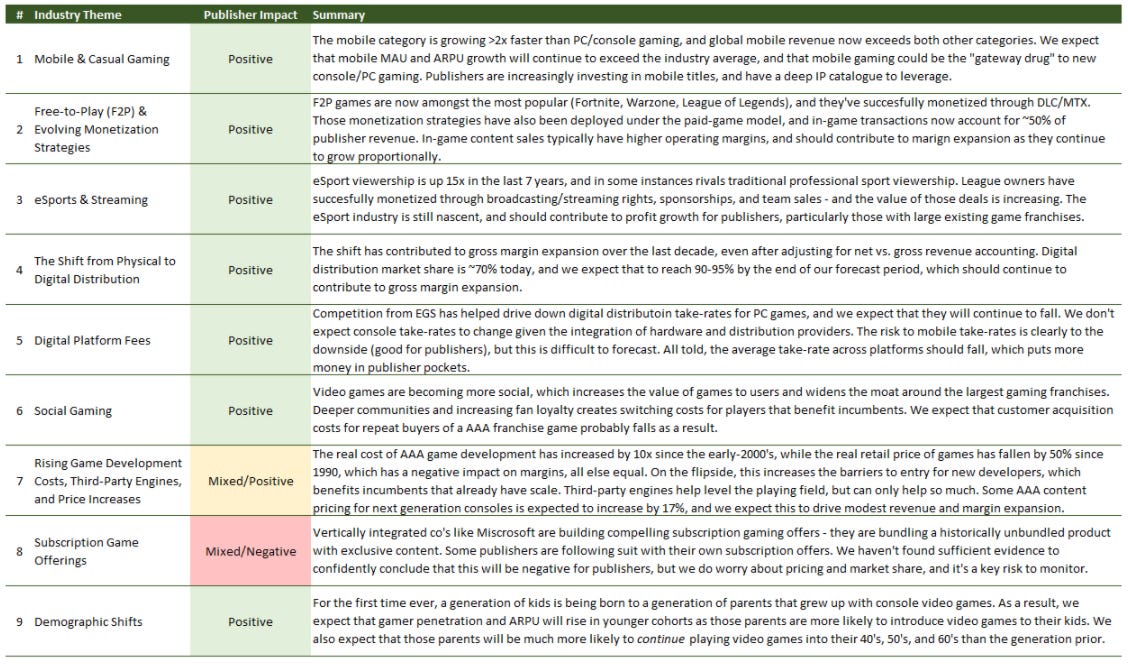One Step Up #34
This week we look at the video games industry, Lawrence Stroll + Aston Martin, Apple, Its Control Over the iPhone, The Internet, And The Metaverse, Lessons from Bernard Baruch, AmazonPrime & Imitation
All Things Video Games
If you ever wanted to understand the industry and companies behind the GTA franchise, FIFA, Madden NFL, NBA, Red Dead Redemption, Call of Duty + more, that are leading the way, this 4 part series by @the10thman1 is THE place to start. It’s a tour de force of the industry structure, themes, and the investment thesis around 3 of the main listed players.
Thinking Big: Lawrence Stroll's Race to the Top
It takes a special kind of person to oversee a company, which since its founding in 1913, has gone bankrupt seven times. The stock price had been absolutely heading south since listing on the LSE in 2018.
Fortunately, for Aston Martin, Stroll is exactly that. This is such a great read on Stroll’s past and how he’s taken the reins at the company and is trying to turn it around.
Apple, Its Control Over the iPhone, The Internet, And The Metaverse
Undoubtedly, this is the long read of the week for me.
Extremely thought provoking essay by Matthew Ball, where he writes about how Apple is essentially hindering the next generation of innovation (to their own benefit).
10 Timeless Lessons from Bernard Baruch
Known as "The Lone Wolf of Wall Street", Bernard Baruch was one of the the world's most famous speculators of the 20th Century. By the age of 30, Mr. Baruch had amassed a fortune. He went on to advise US presidents and congressional leaders from 1918 to 1948.
In his memoir, he lays out 10 guidelines from his experience in the markets. Written 64 years ago, they’re still relevant.
My favourite bits (given the current market environment):
Don't try to buy at the bottom and sell at the top. This can't be done, except by liars.
Always keep a good part of your capital in a cash reserve. Never invest all your funds.
How did Amazon Prime come into existence?

Sometimes all it takes is for someone to raise their hand and blurt out a wild idea and others to just support the seemingly crazy nature of it all and dive right into it.
Ironically, the more we imitate others, the more we discover how we’re different. There’s a long lineage of comedians who tried to copy each other, failed, and became great themselves: Johnny Carson tried to copy Jack Benny, but failed and won six Emmy awards. Then, David Letterman tried to copy Johnny Carson, but failed and became one of America’s great television hosts. Reflecting on his own influences, Conan O’Brien said: “It is our failure to become our perceived ideal that ultimately defines us and makes us unique.” All of them learned that imitation reveals our identity, especially when we fall short of those we admire.
Instead of trying to be original, mirror others so intensely that the glitter of their brilliance shines upon your craft. It’s the closest you can get to a conversation with the artist. Aim for perfection but pay attention to your mistakes, for they hold the seeds of your individuality.
Till next time folks.
What separates the great players from the good ones? The great ones always step up in high pressure moments.
Replace players with any one else and the answer still holds. The lesson:Step up. Embrace the pressure.




